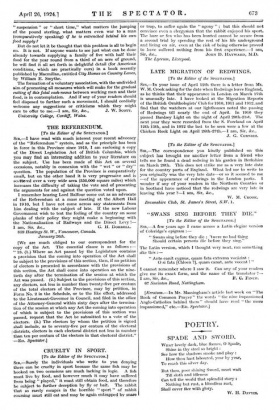GROW YOUR OWN FOOD.
[To the Editor of the SPECTATOR.]
SIR,—The wheel of our industrial fortunes has brought us down into the trough of unemployment again ; but we are continuing so long in it this time that thoughtful men see well enough palliatives will not do. The disease is entering into the very foundations of our society ; and unless our industrial civilization can be helped to pull gradually away into a quite new direction of development, it bids fair to make an end of us.
Very clearly, in their effort to get rid of it, our statesmen do not know what to do. But that is not the worst of it The tragedy of the situation is that the economists have not been able to tell them even what to try to do. They do not even know what to aim at. There are practical difficulties in every remedy. But the experts have not been able to say, yet, even what would be a remedy.
Now, I would like to submit to the readers of the Spectator that at least this impasse is at an end. We do now see a remedy. And if it is once seen clearly enough, by a sufficient number of people, the whole battle with the problem of recurrent unemployment enters on a new era of hope.
The remedy lies in home food production, taught in the schools.
The great majority of boys have to work with their hands ; the great majority of girls too. Let us equip all our children against the chance—their chance is three out of four—that they will be of the number who have to work with their hands. Let every boy, by fourteen, be utterly familiar with how to take just the eggs, milk, fruits, vegetables and meat which his family consume in the year, and take them exactly and neatly, out of one third of an acre of ground. Let every girl at fourteen know at least how to dress a fowl with her own hands, and how to handle all the delightful variety of a garden-grown menu. Regionate all your history and geo- graphy and science around your school food-garden. Let the children " study " it as much as you please. But have first things first, and make them at least able to handle it, take everything out of it (approximately) that a family needs to eat, in just the best way, making this absolutely second nature to them so that they could do it all blind.
This done, let there be the third of an acre for every working man who wants it. It will cost the State nothing. He will be able to buy the ground by instalments with what he can save through making food instead of buying it. For seven-and-sixpence a week above what he now pays in rent he could own a house and a third of an acre in twenty years, if it were erected, along with a thousand similar, in a " Homecroft Settlement," within travelling distance of his work in the city.
Is there a snag in this seven-and-sixpence ? I do not know. That is precisely what I should like any of your readers who are interested to think out. What I do know is that if there is not, the problem of unemployment has gone a long step forward. We do not know what to do yet. But we have got something, not entirely hopeless—like the attempt to stop " trade cycles "—to try. And that is all our weary statesmen ask for—something real to try.
It is to be noted that the man is not supposed to make that seven-and-sixpence in trade. For then he is still the victim of the trade cycle. His market may any day fail. There is but one market that is his, namely, his own table ; and that is one that never fails.
But how much can he actually supply himself with? Well; that is the question. Was there ever a more enthrallingly interesting one ? Science should be mobilized to the last man for the solution of it. The moment this problem is solved, the remedy for unemployment is invented. What matters " suspension " or " short time," what matters the jumping of the pound sterling, what matters even war to a man (comparatively speaking) if he is entrenched behind his own food supply ?
But do not let it be thought that this problem is all to begin on. It is not. If anyone wants to see just what can be done already towards supplying a family of five with half their food for the year round from a third of an acre of ground, he will find it all set forth in delightful detail (for American conditions, which are practically ours) in a book recently published by Macmillan, entitled City Homes on Country Lanes, by William E. Smythe.
The formation of a voluntary association, with the undivided aim of promoting all measures which will make for the gradual culling of this fatal cash-nexus between working men and their food, is in contemplation. And if any of your readers should feel disposed to further such a movement, I should cordially welcome any suggestions or criticisms which they might care to offer to me.—I am, Sir, &c., J. W. Scorr. University College, Cardiff, Wales.











































 Previous page
Previous page